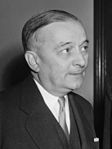French legislative election, 1951
|
|
|||||||||||||||||||||||||||||||||||||||||||||||||||||||||||||||||||||||||||||||||||||
|---|---|---|---|---|---|---|---|---|---|---|---|---|---|---|---|---|---|---|---|---|---|---|---|---|---|---|---|---|---|---|---|---|---|---|---|---|---|---|---|---|---|---|---|---|---|---|---|---|---|---|---|---|---|---|---|---|---|---|---|---|---|---|---|---|---|---|---|---|---|---|---|---|---|---|---|---|---|---|---|---|---|---|---|---|---|
|
|||||||||||||||||||||||||||||||||||||||||||||||||||||||||||||||||||||||||||||||||||||
|
All 625 seats to the French National Assembly 313 seats were needed for a majority |
|||||||||||||||||||||||||||||||||||||||||||||||||||||||||||||||||||||||||||||||||||||
|
|||||||||||||||||||||||||||||||||||||||||||||||||||||||||||||||||||||||||||||||||||||
|
|||||||||||||||||||||||||||||||||||||||||||||||||||||||||||||||||||||||||||||||||||||
Legislative elections were held in France on 17 June 1951 to elect the second National Assembly of the Fourth Republic.
After the Second World War, the three parties which took a major part in the French Resistance to the German occupation dominated the political scene and government: the French Communist Party (PCF), the French Section of the Workers' International (SFIO, socialist party) and the Christian democratic Popular Republican Movement (MRP). The forces associated with the Third Republic and the 1940 disaster (the Radical Party and the classical Right) were considered as archaic and were the losers of the post-war elections.
Nevertheless, after the proclamation of the Fourth Republic, the 1947 strikes and the beginning of the Cold War, the Three-parties alliance split. In spring 1947, the Communist ministers were dismissed. In the same time, Charles de Gaulle, symbol of the Resistance, founded his Rally of the French People (RPF) which campaigned for constitutional reform and criticized the "parties' regime" as a rebirth of the defunct Third Republic.
The Socialists and the Christian-Democrats allied with the Rally of the Republican Lefts (composed of the Radicals and the Democratic and Socialist Union of the Resistance, UDSR) and right-wing groupings to form the Third Force. This coalition defended the regime against the opposition of the Communists on the one hand, and the Gaullists on the other. But this diverse alliance did not lead to a stable executive power. Indeed, its components advocated opposing policies on the economy, the finances of the state, secularism (laïcité) and denominational schools. This discontent was beneficial to the Communists and the Gaullists.
...
Wikipedia




